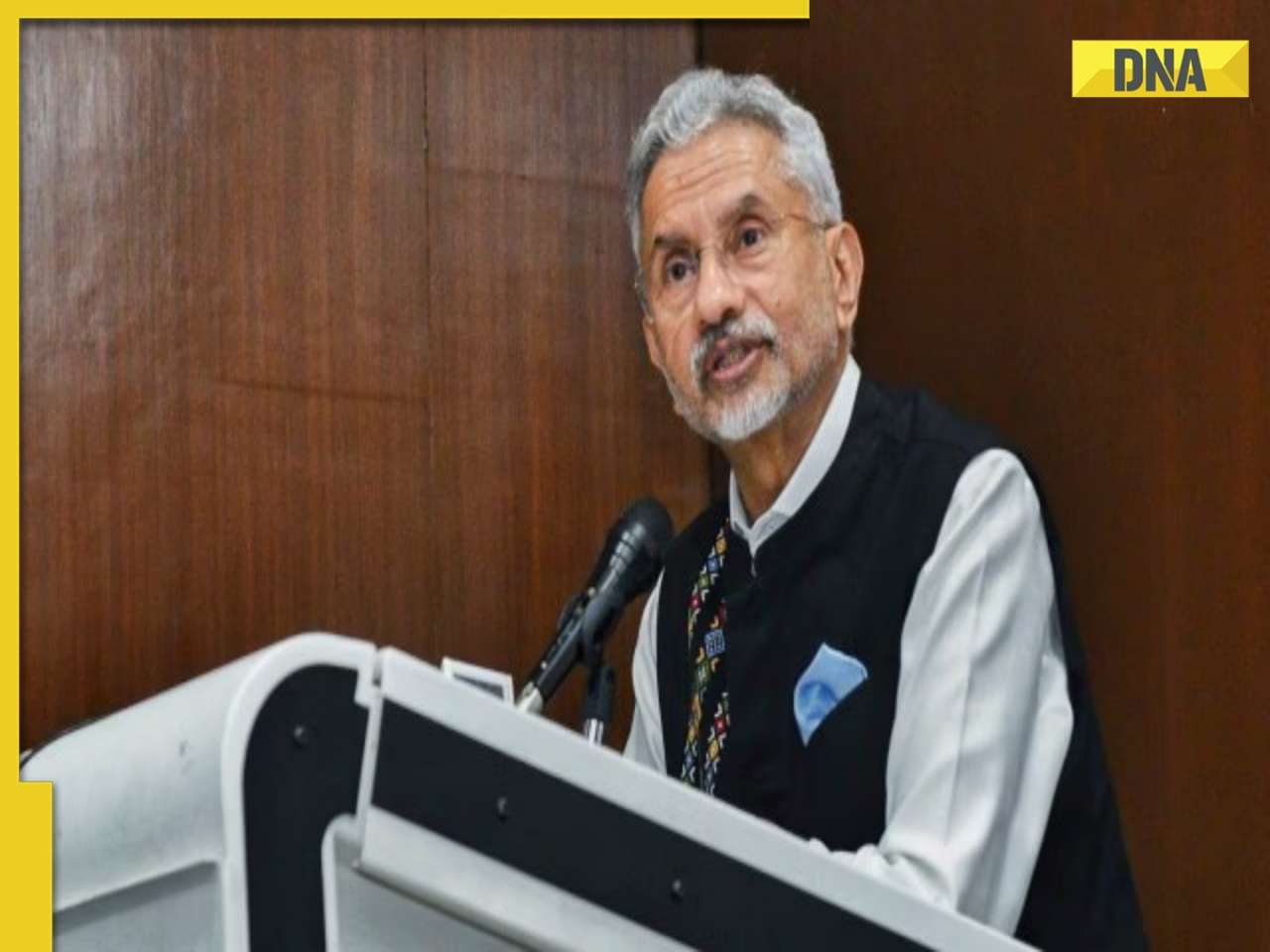Recently, the Gujarat government banned a book written on Muhammad Ali Jinnah by invoking section 153/A-B of the constitution. This incident refreshed memories of Gandhiji in my mind.
Recently, the Gujarat government banned a book written on Muhammad Ali Jinnah by invoking section 153/A-B of the constitution. This incident refreshed memories of Gandhiji in my mind. The British government arrested Gandhiji on charges of sedition for his article written in 1922; he was awarded imprisonment for six months. The incident was portrayed by Gujarati painter Ravishankar Rawal, who was present in the court during the trial. This painting is still lying at the Circuit House in Ahmedabad as a testimony to the incident.
Moreover, at the time when Mrs Indira Gandhi was the prime minister, she spread the message 'Indira is India' and sent many politicians to jail and also brought charges of sedition against them.
It is sad that these politicians forgot the meaning of freedom envisaged by Gandhiji. They misinterpreted freedom as transfer of political power from the whites to the blacks. This is why they started conspiring to eliminate freedom of expression.
Defining freedom in his book, (Young India, 1925)), Gandhiji had said, "It means undertaking unceasing endeavours to free oneself from government control; whether the government is foreign or of our own country. Moreover, true freedom is not achieved when political power is in the hands of the few, but when every citizen gets equal courage to protest against misuse of power."
In states where books are banned, don't you think 'freedom' means continuous endeavour to keep the people under control? And since we are talking about books and articles, we must talk about writers as well. In 1936, when Gandhiji was the president of Gujarati Sahitya Parishad, he asked men of letters, "For whom we are going to create literature? For Kasturbhai & Co, Ambalalabhai or for Sir Chinubhai? They could patron as many writers as they wish and purchase many books because they have money. But what about the women? They are looking for an identity too."
The prominent personalities of the literary world do remember Gandhiji's comment on the language that could be understood by the Koshias (labour class). But are there any authors or publication houses willing to either create or publish literature for the poor in the villages. Even the institutes set up by Gandhiji are not promoting any such activities.
Many literary laureates are still presenting women as mere puppets in spite of the fact that women of the Gandhian period came out on the streets making demands for their rights.
Gandhiji had realised the strength of women during the satyagrahas in South Africa, and this could be one of the reasons why women remained on the forefront during the freedom struggle, undaunted by the probabilities of going to jail. Gandhiji's inspiration coupled with such an electrifying atmosphere led the women to set up Jyotisangh in 1934.
At the time, women, except those who owned property, did not have the right to vote during the Ahmedabad municipality elections.
It was when the women associated with Jyotisangh rallied for the fundamental right that this marginalised section was brought to prominence.
Although Gandhiji championed the cause of women, he failed to do the same in the case of the dalits (schedule caste) and labour class.
For Gandhiji the term untouchable was a blot on Hinduism. But, on the other hand he accepted varna vyavastha (caste system) and said, "I do believe in varna vyavastha. The castes are based on traditional professions," (Navajivan 1931).
He did advocate abolition of untouchability and even appealed whole-heartedly to the upper caste Hindus to accept dalits. But he never really motivated the dalits to fight for their rights. Unfortunately, the idea of untouchables persisted in Gujarat and is being practised even today, subtly in some places and blatantly in others.
To add to this, social issues are becoming more complicated, leading many to believe that the freedom achieved by Gandhiji by means of Ahimsa is a sham. The need of the hour is to fight for both political and social reforms.
(The writer is a social activist.)
![submenu-img]() 'They unilaterally took some measures': EAM Jaishankar on new Nepal 100 rupee currency
'They unilaterally took some measures': EAM Jaishankar on new Nepal 100 rupee currency![submenu-img]() Meet Ice Cream Lady of India, who built Rs 6000 crore company, started with small investment of Rs…
Meet Ice Cream Lady of India, who built Rs 6000 crore company, started with small investment of Rs…![submenu-img]() ‘Canada a rule-of-law country’: PM Trudeau after 3 Indian arrested over Hardeep Nijjar's murder
‘Canada a rule-of-law country’: PM Trudeau after 3 Indian arrested over Hardeep Nijjar's murder![submenu-img]() Viral video: Specially-abled girl’s energetic dance to Bollywood song wows internet, watch
Viral video: Specially-abled girl’s energetic dance to Bollywood song wows internet, watch![submenu-img]() 'Baap re baap': Imtiaz Ali reveals Diljit Dosanjh was scandalised by old women's 'vulgar' improvisation on Chamkila set
'Baap re baap': Imtiaz Ali reveals Diljit Dosanjh was scandalised by old women's 'vulgar' improvisation on Chamkila set![submenu-img]() DNA Verified: Is CAA an anti-Muslim law? Centre terms news report as 'misleading'
DNA Verified: Is CAA an anti-Muslim law? Centre terms news report as 'misleading'![submenu-img]() DNA Verified: Lok Sabha Elections 2024 to be held on April 19? Know truth behind viral message
DNA Verified: Lok Sabha Elections 2024 to be held on April 19? Know truth behind viral message![submenu-img]() DNA Verified: Modi govt giving students free laptops under 'One Student One Laptop' scheme? Know truth here
DNA Verified: Modi govt giving students free laptops under 'One Student One Laptop' scheme? Know truth here![submenu-img]() DNA Verified: Shah Rukh Khan denies reports of his role in release of India's naval officers from Qatar
DNA Verified: Shah Rukh Khan denies reports of his role in release of India's naval officers from Qatar![submenu-img]() DNA Verified: Is govt providing Rs 1.6 lakh benefit to girls under PM Ladli Laxmi Yojana? Know truth
DNA Verified: Is govt providing Rs 1.6 lakh benefit to girls under PM Ladli Laxmi Yojana? Know truth![submenu-img]() Streaming This Week: Heeramandi, Shaitaan, Manjummel Boys, latest OTT releases to binge-watch
Streaming This Week: Heeramandi, Shaitaan, Manjummel Boys, latest OTT releases to binge-watch![submenu-img]() Remember Ayesha Kapur? Michelle from Black, here's how actress, nutrition coach, entrepreneur looks after 19 years
Remember Ayesha Kapur? Michelle from Black, here's how actress, nutrition coach, entrepreneur looks after 19 years![submenu-img]() Remember Heyy Babyy's cute 'Angel' Juanna Sanghvi? 20 year-old looks unrecognisable now, fans say 'her comeback will...'
Remember Heyy Babyy's cute 'Angel' Juanna Sanghvi? 20 year-old looks unrecognisable now, fans say 'her comeback will...'![submenu-img]() In pics: Arti Singh stuns in red lehenga as she ties the knot with beau Dipak Chauhan in dreamy wedding
In pics: Arti Singh stuns in red lehenga as she ties the knot with beau Dipak Chauhan in dreamy wedding![submenu-img]() Actors who died due to cosmetic surgeries
Actors who died due to cosmetic surgeries![submenu-img]() DNA Explainer: Why Harvey Weinstein's rape conviction was overturned, will beleaguered Hollywood mogul get out of jail?
DNA Explainer: Why Harvey Weinstein's rape conviction was overturned, will beleaguered Hollywood mogul get out of jail?![submenu-img]() What is inheritance tax?
What is inheritance tax?![submenu-img]() DNA Explainer: What is cloud seeding which is blamed for wreaking havoc in Dubai?
DNA Explainer: What is cloud seeding which is blamed for wreaking havoc in Dubai?![submenu-img]() DNA Explainer: What is Israel's Arrow-3 defence system used to intercept Iran's missile attack?
DNA Explainer: What is Israel's Arrow-3 defence system used to intercept Iran's missile attack?![submenu-img]() DNA Explainer: How Iranian projectiles failed to breach iron-clad Israeli air defence
DNA Explainer: How Iranian projectiles failed to breach iron-clad Israeli air defence![submenu-img]() 'Baap re baap': Imtiaz Ali reveals Diljit Dosanjh was scandalised by old women's 'vulgar' improvisation on Chamkila set
'Baap re baap': Imtiaz Ali reveals Diljit Dosanjh was scandalised by old women's 'vulgar' improvisation on Chamkila set![submenu-img]() This actor, who worked with Karan Johar and Farhan Akhtar, gave superhit shows, saw failed marriage, killed himself at..
This actor, who worked with Karan Johar and Farhan Akhtar, gave superhit shows, saw failed marriage, killed himself at..![submenu-img]() Did you know Ranveer Singh's grandmother was popular actress? Worked with Raj Kapoor; her career affected due to...
Did you know Ranveer Singh's grandmother was popular actress? Worked with Raj Kapoor; her career affected due to...![submenu-img]() India's highest-paid TV actress began working at 8, her Bollywood films flopped, was seen in Bigg Boss 1, now charges...
India's highest-paid TV actress began working at 8, her Bollywood films flopped, was seen in Bigg Boss 1, now charges...![submenu-img]() Shreyas Talpade wonders if his heart attack was due to Covid vaccine: 'We don’t know what we have taken inside...'
Shreyas Talpade wonders if his heart attack was due to Covid vaccine: 'We don’t know what we have taken inside...'![submenu-img]() IPL 2024: Faf du Plessis, Virat Kohli help Royal Challengers Bengaluru defeat Gujarat Titans by 4 wickets
IPL 2024: Faf du Plessis, Virat Kohli help Royal Challengers Bengaluru defeat Gujarat Titans by 4 wickets![submenu-img]() IPL 2024: Why is Sai Kishore not playing today's RCB vs GT match?
IPL 2024: Why is Sai Kishore not playing today's RCB vs GT match?![submenu-img]() 'Mumbai Indians ki kahani khatam': Ex-India star slams Hardik Pandya after MI's loss to KKR at Wankhede
'Mumbai Indians ki kahani khatam': Ex-India star slams Hardik Pandya after MI's loss to KKR at Wankhede![submenu-img]() LSG vs KKR, IPL 2024: Predicted playing XI, live streaming details, weather and pitch report
LSG vs KKR, IPL 2024: Predicted playing XI, live streaming details, weather and pitch report![submenu-img]() LSG vs KKR IPL 2024 Dream11 prediction: Fantasy cricket tips for Lucknow Super Giants vs Kolkata Knight Riders
LSG vs KKR IPL 2024 Dream11 prediction: Fantasy cricket tips for Lucknow Super Giants vs Kolkata Knight Riders![submenu-img]() Viral video: Specially-abled girl’s energetic dance to Bollywood song wows internet, watch
Viral video: Specially-abled girl’s energetic dance to Bollywood song wows internet, watch![submenu-img]() Viral video: Man educates younger brother about mensuration, internet is highly impressed
Viral video: Man educates younger brother about mensuration, internet is highly impressed![submenu-img]() Girl's wedding dance to Haryanvi song interrupted by mother in viral video, internet reacts
Girl's wedding dance to Haryanvi song interrupted by mother in viral video, internet reacts![submenu-img]() Viral video: Man fearlessly grabs dozens of snakes, internet is scared
Viral video: Man fearlessly grabs dozens of snakes, internet is scared![submenu-img]() This mysterious mobile phone number was suspended after three users...
This mysterious mobile phone number was suspended after three users...

















































)
)
)
)
)
)